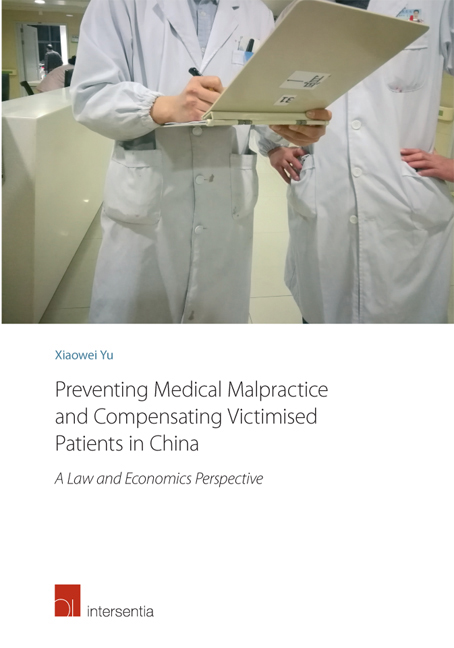 Preventing Medical Malpractice and Compensating Victimised Patients in China
Preventing Medical Malpractice and Compensating Victimised Patients in China Book contents
- Frontmatter
- Acknowledgements
- Contents
- Abbreviations
- List of Figures and Tables
- Chapter 1 Introduction
- Part I Legal Remedies for Medical Malpractice in China
- Introductory Note
- Chapter 2 Health Care Provision and Regulation
- Chapter 3 Compensation for Iatrogenic Injuries under Tort Law
- Chapter 4 Medical Disputes, Iatrogenic Injury, Malpractice Litigation, and Patient Compensation: Empirical Evidence
- Chapter 5 Other Compensation Schemes
- Chapter 6 A Doctrinal Evaluation and Tentative Conclusions
- Part II Economic Theories and Empirical Evidence
- Part III Applying the Economic Observations to China
- Summary
- Bibliography
- Appendix 1 Legislation
- Appendix 2 Cases
- Appendix 3 Semi-Structured Interviews
- Valorisation Addendum
- Curriculum Vitae
Chapter 3 - Compensation for Iatrogenic Injuries under Tort Law
from Part I - Legal Remedies for Medical Malpractice in China
Published online by Cambridge University Press: 29 September 2018
- Frontmatter
- Acknowledgements
- Contents
- Abbreviations
- List of Figures and Tables
- Chapter 1 Introduction
- Part I Legal Remedies for Medical Malpractice in China
- Introductory Note
- Chapter 2 Health Care Provision and Regulation
- Chapter 3 Compensation for Iatrogenic Injuries under Tort Law
- Chapter 4 Medical Disputes, Iatrogenic Injury, Malpractice Litigation, and Patient Compensation: Empirical Evidence
- Chapter 5 Other Compensation Schemes
- Chapter 6 A Doctrinal Evaluation and Tentative Conclusions
- Part II Economic Theories and Empirical Evidence
- Part III Applying the Economic Observations to China
- Summary
- Bibliography
- Appendix 1 Legislation
- Appendix 2 Cases
- Appendix 3 Semi-Structured Interviews
- Valorisation Addendum
- Curriculum Vitae
Summary
INTRODUCTION
From an ex post facto perspective of a case where an iatrogenic injury suffered by a patient occurred, one may wonder what the potential legal consequences of iatrogenic injuries could be in China. As addressed in Chapter 2, a negligent provider who caused injuries to the patient (a “medical accident”) may be subject to administrative punishments (license suspension/revocation) and/or criminal sanctions (imprisonment). Some consequential losses such as medical expenses may be covered by various insurance or social security schemes. This Chapter focuses on the system of private law compensation for iatrogenic injuries. Specifically, it will explore the issue of what legal rules or regimes victimised patients may rely on to obtain redress and how good they may appear according to the available literature in China (part of Sub-question (1-a)).
To begin with, Section 2 will briefly summarise the development of the Chinese medical malpractice liability system. Then, currently applicable rules concerning medical malpractice will be discussed in detail in Section 3.
DEVELOPMENT
Medical malpractice liability was first developed in the West hundreds of years ago. As a matter of history, medical malpractice liability can be traced back to the fourteenth century in England and the late eighteenth century in the US. In France, medical malpractice liability began to grow at the end of the eighteenth century. In China (PRC), however, medical malpractice liability had not been taken seriously until the late 1980's when China began to rebuild its civil law regime after the Cultural Revolution.
The evolution of medical malpractice liability in modern China is full of twists and turns. Before the 1980's, few medical malpractice claims were brought before the court when neither a substantive civil law regime nor a well-functioning civil litigation system was available in Mao's China. Most of the medical accidents were handled by the administrative authorities and some criminal penalties were imposed on negligent providers. Some evidence shows that although the victimised patient or his/her family members were not allowed to obtain compensation from hospitals concerned, they might get some limited financial aid from the government if they fell into financial dislocations due to the death or disability of the patient. Also, part of the medical expenses, lost earnings and/or loss of maintenance due to iatrogenic injuries might also be covered by then social security schemes for public officials and employees (the GFMCS and the LIS).
- Type
- Chapter
- Information
- Preventing Medical Malpractice and Compensating Victimised Patients in ChinaA Law and Economics Perspective, pp. 65 - 114Publisher: IntersentiaPrint publication year: 2017


